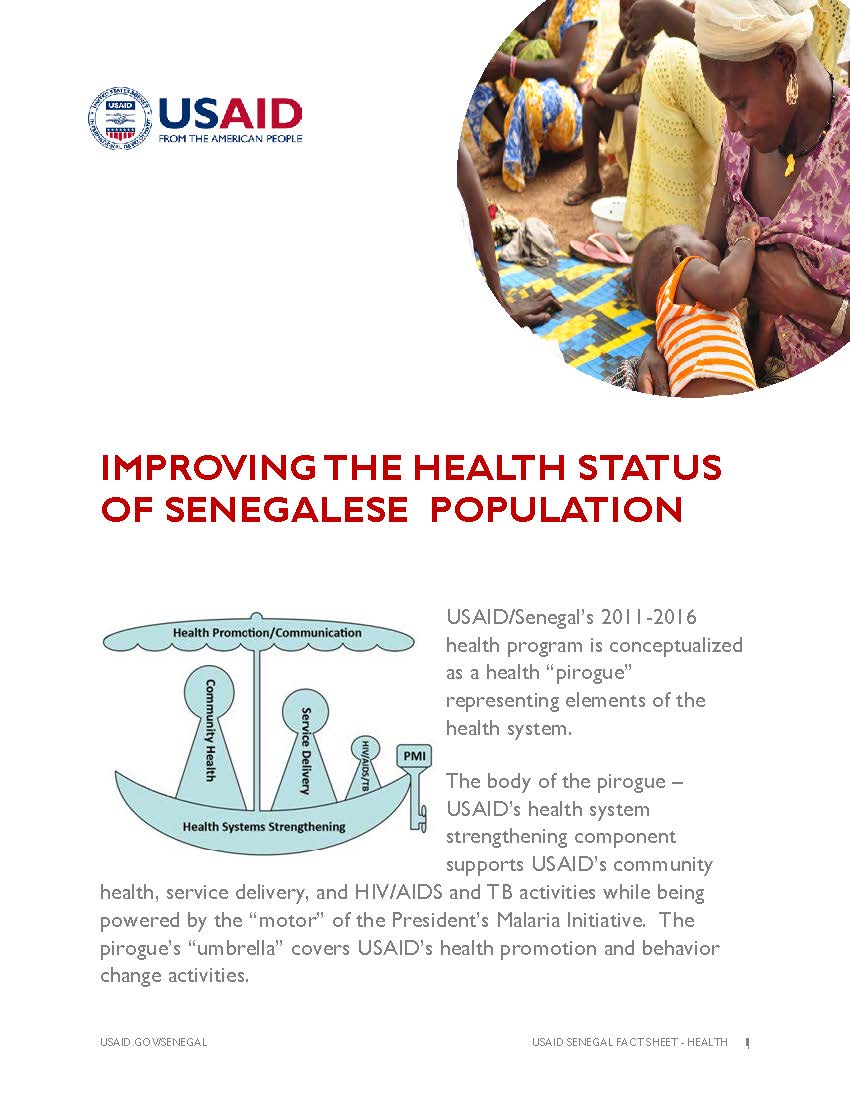Since 1979, USAID’s health program has supported the Ministry of Health and local communities to reduce maternal and child deaths, prevent infectious disease and other illness, and help people live healthier lives. In addition to fighting major diseases like malaria, tuberculosis and HIV/AIDS, USAID strengthens national and local health systems, supports family planning programs to allow couples to have children when they want them and helps communities plan and finance their own health services. USAID’s health program aims to put quality health services within easy reach of the majority of Senegal’s people.
USAID and other donors have contributed to important health gains in Senegal.
- Since 1990, child mortality in Senegal has declined more than 40 percent.
- In contrast to other countries in sub-Saharan Africa, Senegal’s adult HIV/AIDS rate has remained below 1 percent.
To advance local ownership and sustainability, we are increasing direct partnerships with the Government of Senegal and local organizations. With USAID’s support, Senegal will be the first country in Africa to adopt a continuous Demographic and Health Survey to supplement the tradition survey that takes place every five years. Beginning in 2013, policy-makers, program managers, and researchers can access new information every year for monitoring and decision-making.
Maternal and Child Health
USAID supports the Ministry of Health in preventing and treating the most common causes of illness and death among mothers and children. While child and maternal mortality rates continue to decrease, they remain too high. To address these needs, we have scaled-up implementation of key, life-saving interventions including active management of the third stage of labor and essential newborn care. USAID is the first donor to successfully deploy these new interventions to the field, which include:
- Basic preventive newborn care, such as care before and during pregnancy, clean delivery practices, temperature maintenance, eye and cord care, early and exclusive breastfeeding and general hygiene emphasizing handwashing
- Early detection of newborn problems or danger signs—sepsis, birth asphyxia, prematurity—appropriate treatment, referral and care-seeking
In addition, USAID supports the prevention, diagnosis, and treatment of infectious diseases affecting pregnant women and young children, including malaria and pneumonia.
HIV/AIDS and TB
Although the adult prevalence rate of HIV in Senegal is less than 1 percent, several specific populations face higher rates and risks of infection. USAID targets these higher-risk groups with HIV prevention education and access to voluntary counseling and testing. In 2000, Senegal had one center for counseling and testing; today, counseling and testing services are available throughout the country, counselors are better trained and the number of people receiving voluntary testing has increased dramatically.
USAID has provided nearly 8,000 people living with HIV with medical, psychosocial and nutritional care. In addition, USAID is addressing the needs of patients co-infected with HIV and TB by extending training for diagnosis, treatment, referrals and care coordination.
Malaria
As part of the President’s Malaria Initiative, USAID has distributed nearly 4 million mosquito nets and trained more than 4,000 people to diagnose and treat malaria in Senegal. USAID is expanding integrated health services countrywide to improve the nutritional health of women and children and maternal and child health through health systems strengthening.
Family Planning
IMPROVING HEALTH IN SENEGAL ![]() (pdf - 250k)
(pdf - 250k)
Nearly one in three Senegalese women report that they would like to avoid or delay pregnancy, but do not currently use any method of family planning. USAID helps to bridge this gap and enable voluntary spacing and delay of births, which results in healthier mothers and children. We also support increasing couples’ access to a wide range of contraceptive methods, including modern natural methods.









Comment
Make a general inquiry or suggest an improvement.